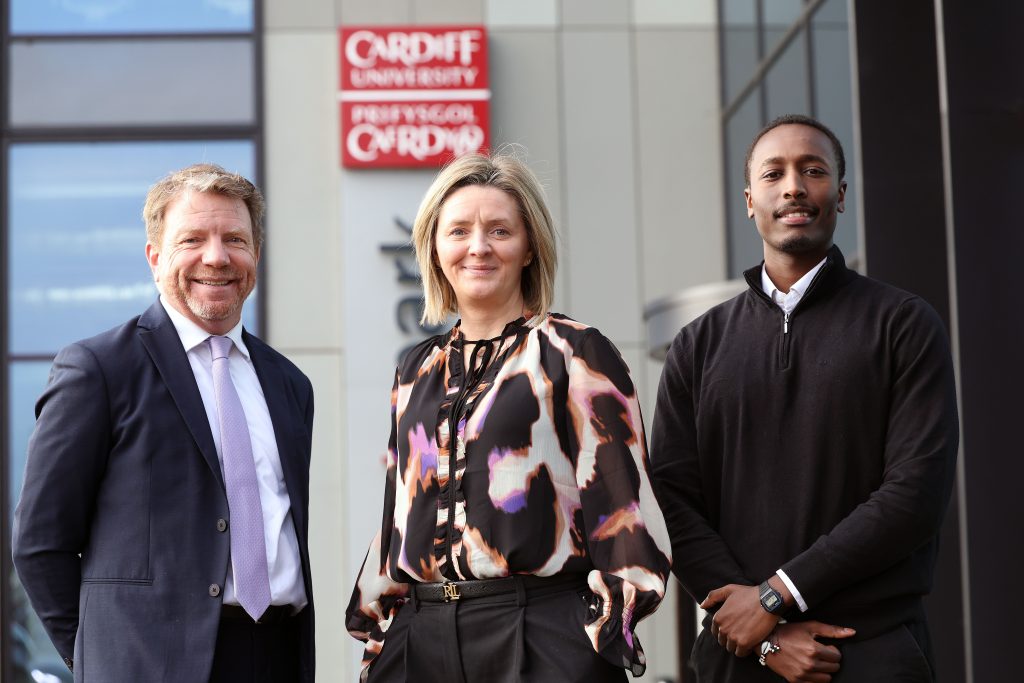Business
Philanthropy support to ‘generous generation’ could unlock money for society

PRO BONO Economics research estimates that there are around 230,000 people under 35 in the UK with net financial assets exceeding £100,000
Nearly all wealthy young people surveyed express a strong desire to have a positive societal impact with their money, with 88% already donating to charity
However, around 110,000 wealthy people under 35 may not have a relationship with a financial or wealth adviser at present.
New research reveals that, while a significant percentage of young people in the UK are keen to contribute to good causes, many are not receiving advice on how best to invest their money.
The research, by Pro Bono Economics (PBE)1, found that while there are around 230,000 people under 35 with net assets exceeding £100,000, roughly 110,000 of those may not be in contact with a financial or wealth adviser.2
As well as unlocking large charitable donations, providing philanthropy support for young wealthy clients would be a significant growth opportunity for financial advisers given their ability to understand and cater to the philanthropic inclinations of what PBE has coined the ’generous generation’ and build long-term relationships with the high-net-worth individuals of the future.
To address this issue PBE brought together the Financial Conduct Authority, the Treasury, and the Department of Culture Media and Sport, as well as an alliance of accredited bodies, government entities, and philanthropy experts, to enhance philanthropy training for advisers.3
An estimated £5.5 trillion is expected to be passed down to younger generations over the next 20 to 30 years – the so-called ‘Great Wealth Transfer’. Financial advisers and firms seeking to attract the business of the 230,000 under-35s who already possess net financial assets exceeding £100,000 will need to adapt.
Encouragingly, 88 per cent of wealthy young people already donate to charity and PBE found that 90 per cent of those surveyed expressed a strong desire to have a positive societal impact with their money. With this generation giving more to charity – and in greater numbers – than ever before, financial advisers will need to tap into their philanthropic instincts.4 Last year 38% donated more than £2,000 to charity last year, compared to 5% of over-55s. This makes them eight times more likely to have made a substantial gift to charity or charities. Despite straitened times, 63% of those surveyed said they would consider increasing their charitable donations, compared to 13% of over-55s.
While this generation is also more likely to seek financial advice – 78% compared to 61% of those over 55 – more than half of wealthy under-35s also indicated they would be more likely to choose a financial adviser who offers philanthropy advice.
One compelling route to engaging with younger clients and potential clients on their giving is through Donor Advised Funds, a convenient charitable giving vehicles which can be funded through cash, shares or third-party entities. Encouragingly, 65% of under 35s5 said they would be interested in investing in a DAF in the future.
Sisters Lauren Gupta and Becky Holmes founded the Helvellyn Foundation, which provides philanthropic grants to individuals and organisations involved in biodiversity and the education of young people. When they first started they found almost no philanthropic advice from financial advisers.
Becky said:
“I found that most advisers focused on just growing your money, with philanthropy always being a secondary consideration. That immediately lost me because that’s not the go-to motivation for everyone. It’s a big deal to push against the status quo – it’s very difficult to get out of that box. A lot of wealth advisers will also not talk about the impact of how money is invested for fear of offending clients, such as whether it will be to the detriment of a habitat or a community.
“My advice to people wanting to give philanthropically is to speak to foundations in the UK and other people who have had that experience before speaking to advisers.”
Lauren said:
“We all live in a society affected by global issues, and advisors need to talk about how wealth management can impact, positively or negatively, these issues. But they don’t seem to offer that, it’s presumed that you are looking to preserve and grow the wealth regardless of the impact – there’s such a protective mindset on it.
“I have also been speaking to advisers about how they engage the next generation of wealth holders, because we were not engaged by the advisers around our family. My caveat is that advice should be more holistic and impact-focused; we are probably more progressive because we didn’t get that engagement and ended up seeking more forward-thinking advice elsewhere! One thing that helped us early on was a wealth coach who talked us through the emotional as well as the planning side of wealth, which we had not seen anywhere else. To anyone thinking about giving money away, you don’t have to start big. Initially a large sum seemed scary, but now we feel more secure and are braver in what we are doing.”
David Clarke set up a project called Wealth Shared which saw 12 people decide how to spend his £100,000 inheritance.
David said:
“My mum died in 2014 and I inherited this amount of money and I had this feeling of not being comfortable with inherited wealth – I don’t think it’s how the world should work so I decided to give it away.
“I went through a thought process of wondering what to do with it, and sent out 600 letters in my local area. The task was they could do anything with the money – and they had to give it away rather than having any lasting relationship with that money – but it could go to any individual or organisation in the world. In the end the money went to organisations in the L8 postcode – an area where there’s a lot of deprivation.
“A lot more people are in a position like me and the amount of wealth inherited is going to massively increase over the coming decades. We’re also in a time where people are more socially aware. “If you’re ever in a position about what to do with the money there’s power in democratising that decision and dispersing the pressure so it’s not all on the individual.”
Nicole Sykes, Director of Policy and Communications at Pro Bono Economics and co-author of the report, said:
“This is an opportune moment for financial advisers with the Great Wealth Transfer, and the time to act is now. By championing philanthropy, advisers can ensure they remain relevant and tap into the significant good will of the generous generation.
“Firms and advisers that do not currently offer philanthropy services or limit their philanthropy offerings to the ultra-wealthy risk being left behind by demographics, demand, and by governmental action. But by evolving and embracing this challenge they can attract the next generation of clients in a competitive market and contribute to a more giving, socially-conscious society.”
Business
Langdon Mill Farm Pembrokeshire expansion signed off

THE FINAL sign-off for plans for a heifer accommodation building and associated works at one of Pembrokeshire’s largest dairy farms, with a milking herd of 2,000 cows, have been given the go-ahead.
In an application backed by councillors at the December meeting of Pembrokeshire County Council’s planning committee, Hugh James of Langdon Mill Farms Ltd sought permission for a 160-metre-long heifer accommodation building, a slurry separation/dewatering building and associated yard areas at 1,215-hectare Langdon Mill Farm, near Jeffreyston, Kilgetty.
A supporting statement through agent Reading Agricultural Consultants said: “The holding currently has a milking herd of approximately 2,000 cows, which are housed indoors for the majority of the year, with dry cows and heifers grazed outdoors when weather and soil conditions permit.

“There has been significant investment in buildings and infrastructure at the farm over the last decade in respect of cattle accommodation, slurry storage, milking facilities, Anaerobic Digestion (AD) plant, feed storage. Recently a calf and weaned calf accommodation buildings were approved by Pembrokeshire County Council with construction almost complete.
“The unit is efficient, achieving yields of more than 10,000 litres/cow/year, with cows being milked three times/day in the 60-point rotary parlour. Langdon Mill Farm currently directly employs 21 full-time, and three part-time staff. Of these, four live on site in the two dwellings opposite the farm, with the remaining staff living in the locality.”
It added: “Although the unit has previously purchased heifers to aid expansion, the farm now breeds most of its own replacements to improve genetics and to minimise the ongoing threat of bovine tuberculosis (bTB).”
It said the proposed building would be used by heifers between the ages of 7-22 months, the siting “directly influenced by the adjacent calf and weaned calf buildings, with livestock being moved from one building to the next as they get older”.
Members unanimously supported the recommendation of approval, giving delegated powers to the interim head of planning to approve the application following the final approval of a habitats regulations assessment.
An officer report published yesterday, February 5, said Natural Resources Wales confirmed it had received the assessment, and, “in consideration of the mitigation measures detailed and on the understanding there is no increase in stock, they agree with the LPA’s conclusion that an adverse effect upon the integrity of the SAC [Special Areas of Conservation] sites can be ruled out”.
Formal delegated approval has now been granted by officers.
Business
Report into Wales SME finance paints mixed picture as barriers remain

A NEW report by the British Business Bank and Economic Intelligence Wales shows that while most Welsh SMEs remain financially stable, many continue to face barriers to accessing finance and are less likely than their counterparts in other devolved nations to seek funding for future growth.
The Wales SME Access to Finance Report 2026 has found that 66% of Welsh SMEs are currently using external finance, and eight in ten (80%) report a positive cash flow position. Despite this, 19% of smaller Welsh businesses reported experiencing barriers to accessing finance, the highest proportion among the devolved nations.
The report also highlights a more cautious outlook among Welsh SMEs when it comes to future investment. Just 17% of Welsh businesses expect to require additional finance over the next year, compared with 42% in Northern Ireland and 47% in Scotland. While 62% of Welsh SMEs that anticipate needing finance say they are confident about securing it, overall demand for funding remains lower than elsewhere in the UK.
Regional variations within Wales are also evident. SMEs based in North Wales and South West Wales were more likely to report barriers to finance (both 21%), while South West Wales businesses were least likely to feel confident about securing additional funding. At the same time, SMEs in South East Wales were most likely to report a finance requirement above £250,000, reflecting differing growth profiles across regions.

The findings underline the importance of a diverse and accessible finance ecosystem to support business investment, innovation and growth across all parts of Wales.
Susan Nightingale, Director UK Network, British Business Bank, said: “Welsh businesses continue to show resilience and confidence, with most reporting positive cash flow and steady growth expectations. Yet, clear regional and structural differences remain in access to finance, particularly for smaller businesses and sole traders. With Wales recording the highest share of smaller businesses experiencing barriers to finance among the devolved nations, it is vital that all businesses, wherever they are in the country, have the knowledge, confidence and support to secure the right finance for them. This will be key to unlocking sustainable growth across every part of Wales.”
Giles Thorley, Chief Executive of the Development Bank of Wales, said: “This year’s Wales SME Access to Finance Report shows a mixed picture. It’s encouraging to see many Welsh SMEs reporting strong cash flow, yet concerning that confidence and demand continue to lag behind other UK nations. If we want our businesses to innovate, invest and grow, closing that gap must remain a priority.
“Improving access to finance isn’t something any one organisation can solve alone, but the Development Bank of Wales will continue to play a vital role in supporting SMEs, working alongside partners across the wider finance ecosystem to help businesses invest, innovate and grow.”
Economic Intelligence Wales is a unique research collaboration between the Development Bank of Wales, Cardiff Business School, Bangor Business School, the Enterprise Research Centre, and the Office for National Statistics (ONS).
Business
International Women’s Day event aims to open doors for future talent in West Wales

BUSINESS leaders, students and policymakers will gather in Pembrokeshire next month to mark International Women’s Day with an event focused on opportunity, leadership and retaining talent in West Wales.

The third annual Partners in Progress: Give to Gain conference will take place on Friday (Mar 6), bringing together established professionals and the next generation of workers to share practical advice and real-world experience.
The event is organised by Institute of Directors Wales, in partnership with Bluestone National Park Resort and the Welsh Government through Trade & Invest Wales.

Hosting the conference in West Wales, rather than a city centre, aims to highlight the growing opportunities available in regional communities and the role local employers play in keeping skilled people closer to home.
Running from 10:00am to 2:00pm, the programme will include panel discussions, site tours and networking sessions. Sixth form, college and university students will be encouraged to question speakers directly about careers, leadership and progression.

Speakers include Belinda Houghton-Jones of RBC Brewin Dolphin, Alex Shufflebottom Jones, former managing director of Shufflebottom Ltd and now an investor and mentor, Dr Owain James of Darogan, and Jane Wallace-Jones, founder of Something Different. The panel will be chaired by Richard Selby, National Chair of IoD Wales.
Organisers say the focus will be firmly practical, with businesses sharing examples of how they are developing staff, widening access to opportunity and building inclusive workplaces.
The discussion comes as Welsh firms continue to report difficulties recruiting and retaining skilled staff. IoD Wales’ latest State of the Nation survey found that skills shortages remain the biggest concern for almost four in ten organisations.
Jo Price, Nations Manager for Wales at IoD Wales, said the aim is to connect experience with ambition.
She said: “Partners in Progress is about bringing people together to tackle real challenges facing businesses and future talent in Wales.
“By connecting leaders and students in West Wales, we can share what works, build confidence and create opportunities where people live and want to work.”

Rebecca Rigby, Director of Operations at Bluestone, added: “We’re proud to host this event for a third year. It’s about creating meaningful connections between future talent and inspirational leaders, and showing what’s possible beyond the big cities.”
Thanks to Welsh Government support, tickets are fully funded, although places are limited. Standard prices are £25 plus VAT for members and £35 plus VAT for non-members.
Places can be booked online via the IoD website.
-

 Crime5 days ago
Crime5 days agoSex offender jailed after living off grid in Pembrokeshire and refusing to register
-

 Health4 days ago
Health4 days agoHealth board targets rise in steroid and gym drug use across west Wales
-

 News6 days ago
News6 days agoPrincess of Wales visits historic Pembrokeshire woollen mill
-

 Crime4 days ago
Crime4 days agoTeacher injured and teenager arrested for attempted murder at Milford Haven School
-

 Crime6 days ago
Crime6 days agoHakin man’s appeal delayed again as Crown Court seeks guidance on insurance law
-

 Crime7 days ago
Crime7 days agoArrest made after Carmarthen park stabbing investigation
-

 Crime5 days ago
Crime5 days agoJohnston man remanded in custody over knife and assault charges
-

 Crime7 days ago
Crime7 days agoMan guilty of threatening to kill Herald editor
























